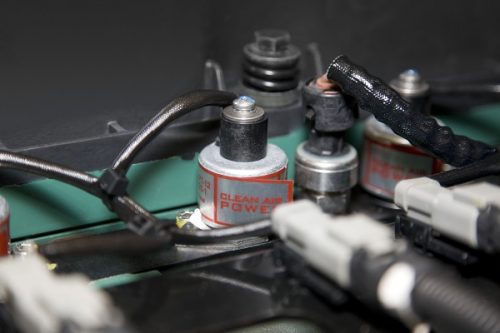Sustainability business signs supplier extension with Volvo

A specialist sustainability business from Melton Mowbray has signed a three-year contract extension with Volvo Truck Corporation, to continue to supply the gas parts for its environmentally-friendly FM Methane Diesel truck.
Since 2010, Clean Air Power has provided the injector technology that enables the dual fuelling of this class of Volvo vehicle. It allows the trucks to be powered by gas rather than rely on diesel alone, which reduces CO2 emissions on longer distances by up to 20% compared with a conventional engine.
The technology will continue to be provided for trucks operating in the UK, mainland Europe and across the world, which are used in areas from waste collection to long-haul transportation.
By adopting this dual fuel approach, the 13 litre, 460HP trucks use around 25% less diesel than an equivalent vehicle, resulting in a corresponding cost reduction for hauliers. The gases used include liquified natural gas, compressed natural gas and biomethane.
Dan Skelton, managing director of Clean Air Power, said: “We are delighted to continue our long-standing relationship with Volvo. We have successfully supplied gas injection and dual fuel technology systems to them for the past decade, as part of the ongoing transition to alternative fuels. It’s unusual for a supplier to get this opportunity for such a long period of time and we look forward to further supporting Volvo’s sustainability drive.”
Clean Air Power is now increasingly setting its sights on the delivery of its DigiJet injection technology for hydrogen combustion. This approach has the potential to reduce to zero the carbon emissions in conventional diesel or gasoline systems, in all modes of transport but particularly in applications where battery and fuel cell technology are not feasible. Clean Air Power has just won a government-backed grant to cut rail freight diesel usage as part of a major decarbonisation initiative.
Skelton added: “As the industry now turns its attention to zero emission technology, we are eager to build on our success in gas injection and demonstrate our hydrogen injection systems, and more generally, how hydrogen combustion can play a role in the delivery of a net-carbon zero future.”







